
rx.observables.BlockingObservable Maven / Gradle / Ivy
/**
* Copyright 2014 Netflix, Inc.
*
* Licensed under the Apache License, Version 2.0 (the "License");
* you may not use this file except in compliance with the License.
* You may obtain a copy of the License at
*
* http://www.apache.org/licenses/LICENSE-2.0
*
* Unless required by applicable law or agreed to in writing, software
* distributed under the License is distributed on an "AS IS" BASIS,
* WITHOUT WARRANTIES OR CONDITIONS OF ANY KIND, either express or implied.
* See the License for the specific language governing permissions and
* limitations under the License.
*/
package rx.observables;
import java.util.*;
import java.util.concurrent.*;
import java.util.concurrent.atomic.AtomicReference;
import rx.*;
import rx.Observable;
import rx.Observer;
import rx.annotations.Experimental;
import rx.exceptions.*;
import rx.functions.*;
import rx.internal.operators.*;
import rx.internal.util.BlockingUtils;
import rx.internal.util.UtilityFunctions;
import rx.subscriptions.Subscriptions;
/**
* {@code BlockingObservable} is a variety of {@link Observable} that provides blocking operators. It can be
* useful for testing and demo purposes, but is generally inappropriate for production applications (if you
* think you need to use a {@code BlockingObservable} this is usually a sign that you should rethink your
* design).
*
* You construct a {@code BlockingObservable} from an {@code Observable} with {@link #from(Observable)} or
* {@link Observable#toBlocking()}.
*
* The documentation for this interface makes use of a form of marble diagram that has been modified to
* illustrate blocking operators. The following legend explains these marble diagrams:
*
* 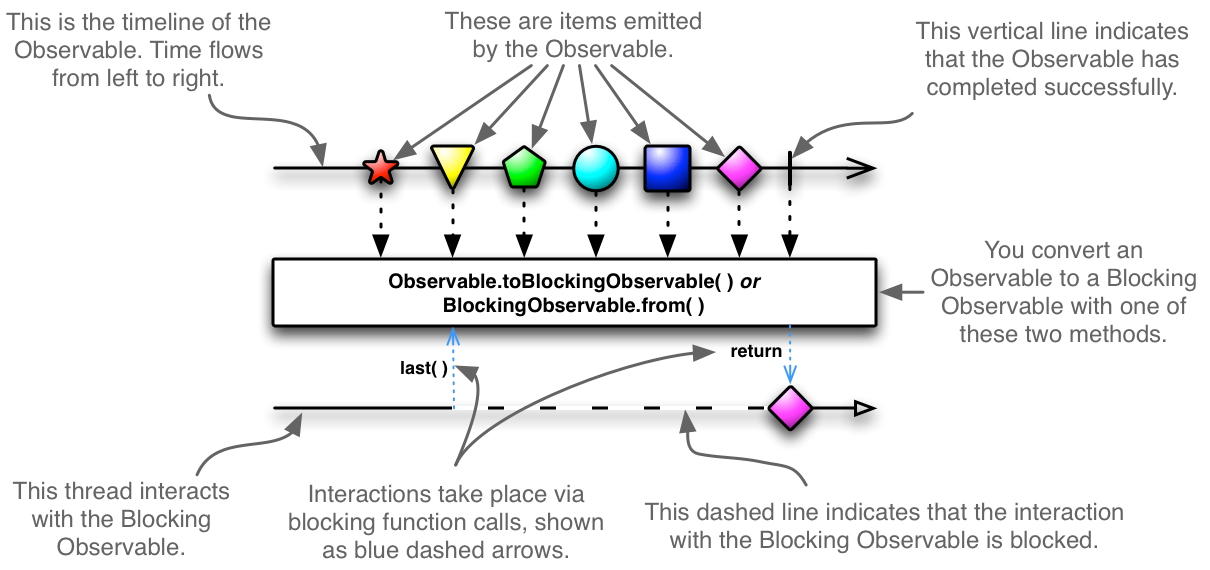 *
* @see RxJava wiki: Blocking
* Observable Operators
* @param
*
* @see RxJava wiki: Blocking
* Observable Operators
* @param
* the type of item emitted by the {@code BlockingObservable}
*/
public final class BlockingObservable {
private final Observable o;
/** Constant to indicate the onStart method should be called. */
static final Object ON_START = new Object();
/** Constant indicating the setProducer method should be called. */
static final Object SET_PRODUCER = new Object();
/** Indicates an unsubscription happened */
static final Object UNSUBSCRIBE = new Object();
private BlockingObservable(Observable o) {
this.o = o;
}
/**
* Converts an {@link Observable} into a {@code BlockingObservable}.
*
* @param the observed value type
* @param o
* the {@link Observable} you want to convert
* @return a {@code BlockingObservable} version of {@code o}
*/
public static BlockingObservable from(final Observable o) {
return new BlockingObservable(o);
}
/**
* Invokes a method on each item emitted by this {@code BlockingObservable} and blocks until the Observable
* completes.
*
* Note: This will block even if the underlying Observable is asynchronous.
*
* 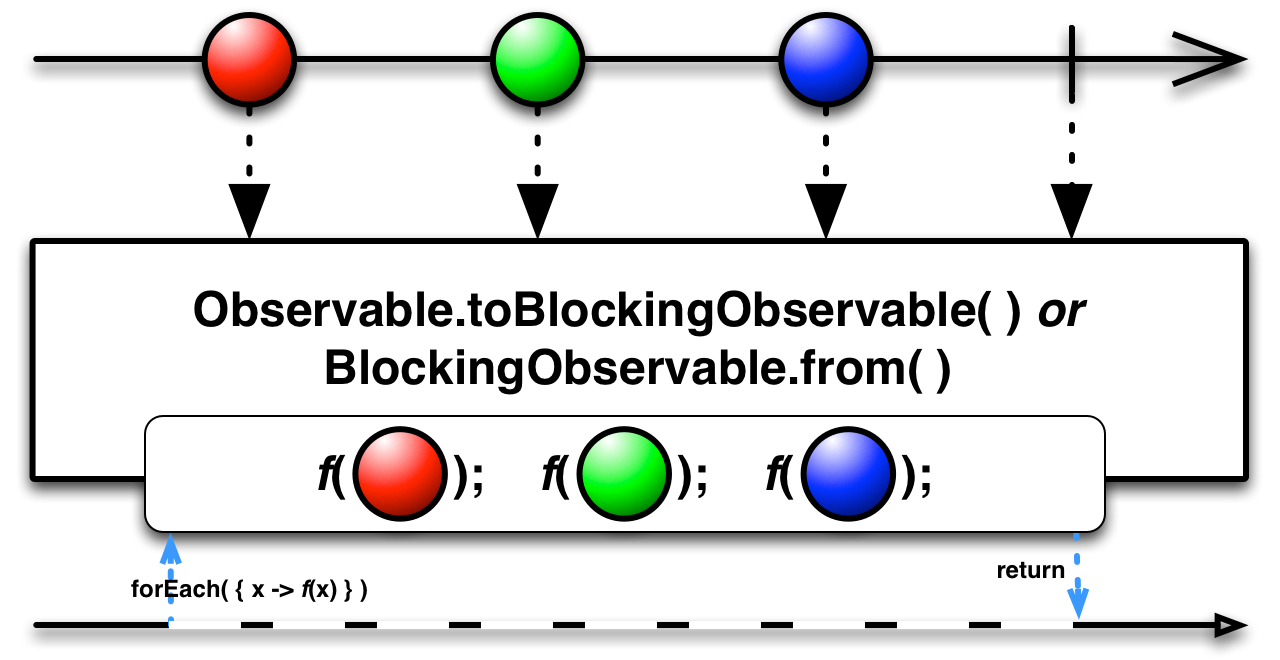 *
*
* This is similar to {@link Observable#subscribe(Subscriber)}, but it blocks. Because it blocks it does not
* need the {@link Subscriber#onCompleted()} or {@link Subscriber#onError(Throwable)} methods. If the
* underlying Observable terminates with an error, rather than calling {@code onError}, this method will
* throw an exception.
*
*
The difference between this method and {@link #subscribe(Action1)} is that the {@code onNext} action
* is executed on the emission thread instead of the current thread.
*
* @param onNext
* the {@link Action1} to invoke for each item emitted by the {@code BlockingObservable}
* @throws RuntimeException
* if an error occurs
* @see ReactiveX documentation: Subscribe
* @see #subscribe(Action1)
*/
public void forEach(final Action1 onNext) {
final CountDownLatch latch = new CountDownLatch(1);
final AtomicReference exceptionFromOnError = new AtomicReference();
/*
* Use 'subscribe' instead of 'unsafeSubscribe' for Rx contract behavior
* (see http://reactivex.io/documentation/contract.html) as this is the final subscribe in the chain.
*/
@SuppressWarnings("unchecked")
Subscription subscription = ((Observable)o).subscribe(new Subscriber() {
@Override
public void onCompleted() {
latch.countDown();
}
@Override
public void onError(Throwable e) {
/*
* If we receive an onError event we set the reference on the
* outer thread so we can git it and throw after the
* latch.await().
*
* We do this instead of throwing directly since this may be on
* a different thread and the latch is still waiting.
*/
exceptionFromOnError.set(e);
latch.countDown();
}
@Override
public void onNext(T args) {
onNext.call(args);
}
});
BlockingUtils.awaitForComplete(latch, subscription);
if (exceptionFromOnError.get() != null) {
Exceptions.propagate(exceptionFromOnError.get());
}
}
/**
* Returns an {@link Iterator} that iterates over all items emitted by this {@code BlockingObservable}.
*
*  *
* @return an {@link Iterator} that can iterate over the items emitted by this {@code BlockingObservable}
* @see ReactiveX documentation: To
*/
@SuppressWarnings({ "unchecked", "cast" })
public Iterator
*
* @return an {@link Iterator} that can iterate over the items emitted by this {@code BlockingObservable}
* @see ReactiveX documentation: To
*/
@SuppressWarnings({ "unchecked", "cast" })
public Iterator getIterator() {
return BlockingOperatorToIterator.toIterator((Observable)o);
}
/**
* Returns the first item emitted by this {@code BlockingObservable}, or throws
* {@code NoSuchElementException} if it emits no items.
*
* @return the first item emitted by this {@code BlockingObservable}
* @throws NoSuchElementException
* if this {@code BlockingObservable} emits no items
* @see ReactiveX documentation: First
*/
public T first() {
return blockForSingle(o.first());
}
/**
* Returns the first item emitted by this {@code BlockingObservable} that matches a predicate, or throws
* {@code NoSuchElementException} if it emits no such item.
*
* @param predicate
* a predicate function to evaluate items emitted by this {@code BlockingObservable}
* @return the first item emitted by this {@code BlockingObservable} that matches the predicate
* @throws NoSuchElementException
* if this {@code BlockingObservable} emits no such items
* @see ReactiveX documentation: First
*/
public T first(Func1 predicate) {
return blockForSingle(o.first(predicate));
}
/**
* Returns the first item emitted by this {@code BlockingObservable}, or a default value if it emits no
* items.
*
* @param defaultValue
* a default value to return if this {@code BlockingObservable} emits no items
* @return the first item emitted by this {@code BlockingObservable}, or the default value if it emits no
* items
* @see ReactiveX documentation: First
*/
public T firstOrDefault(T defaultValue) {
return blockForSingle(o.map(UtilityFunctions.identity()).firstOrDefault(defaultValue));
}
/**
* Returns the first item emitted by this {@code BlockingObservable} that matches a predicate, or a default
* value if it emits no such items.
*
* @param defaultValue
* a default value to return if this {@code BlockingObservable} emits no matching items
* @param predicate
* a predicate function to evaluate items emitted by this {@code BlockingObservable}
* @return the first item emitted by this {@code BlockingObservable} that matches the predicate, or the
* default value if this {@code BlockingObservable} emits no matching items
* @see ReactiveX documentation: First
*/
public T firstOrDefault(T defaultValue, Func1 predicate) {
return blockForSingle(o.filter(predicate).map(UtilityFunctions.identity()).firstOrDefault(defaultValue));
}
/**
* Returns the last item emitted by this {@code BlockingObservable}, or throws
* {@code NoSuchElementException} if this {@code BlockingObservable} emits no items.
*
* 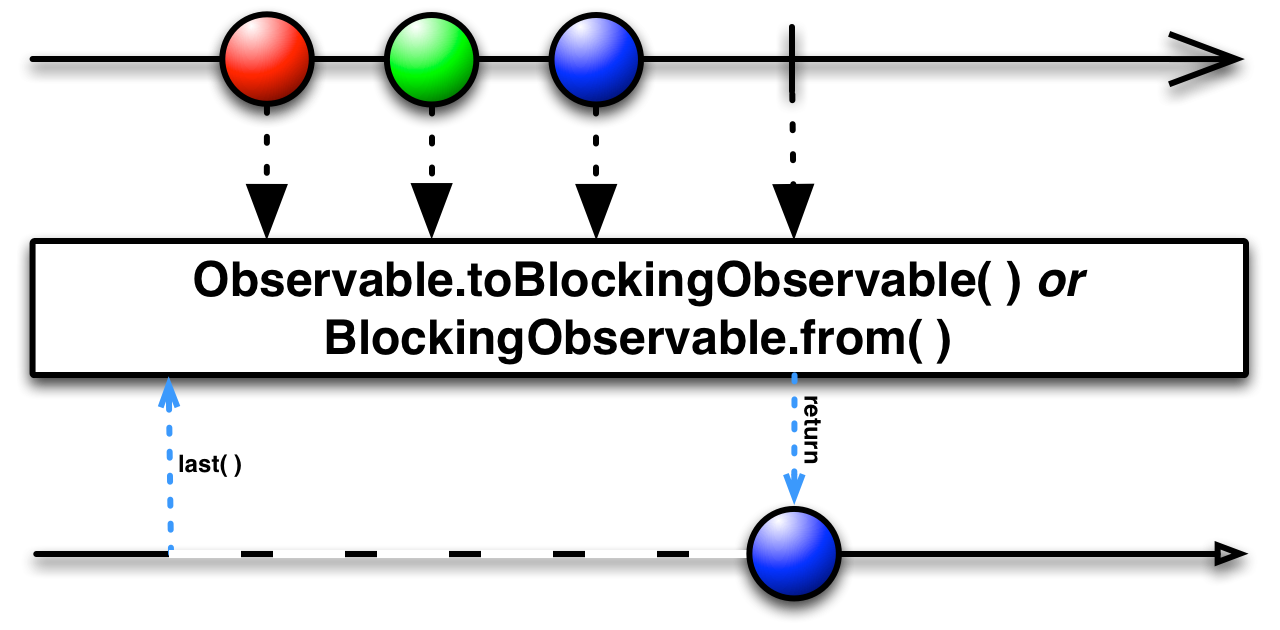 *
* @return the last item emitted by this {@code BlockingObservable}
* @throws NoSuchElementException
* if this {@code BlockingObservable} emits no items
* @see ReactiveX documentation: Last
*/
public T last() {
return blockForSingle(o.last());
}
/**
* Returns the last item emitted by this {@code BlockingObservable} that matches a predicate, or throws
* {@code NoSuchElementException} if it emits no such items.
*
*
* @return the last item emitted by this {@code BlockingObservable}
* @throws NoSuchElementException
* if this {@code BlockingObservable} emits no items
* @see ReactiveX documentation: Last
*/
public T last() {
return blockForSingle(o.last());
}
/**
* Returns the last item emitted by this {@code BlockingObservable} that matches a predicate, or throws
* {@code NoSuchElementException} if it emits no such items.
*
* 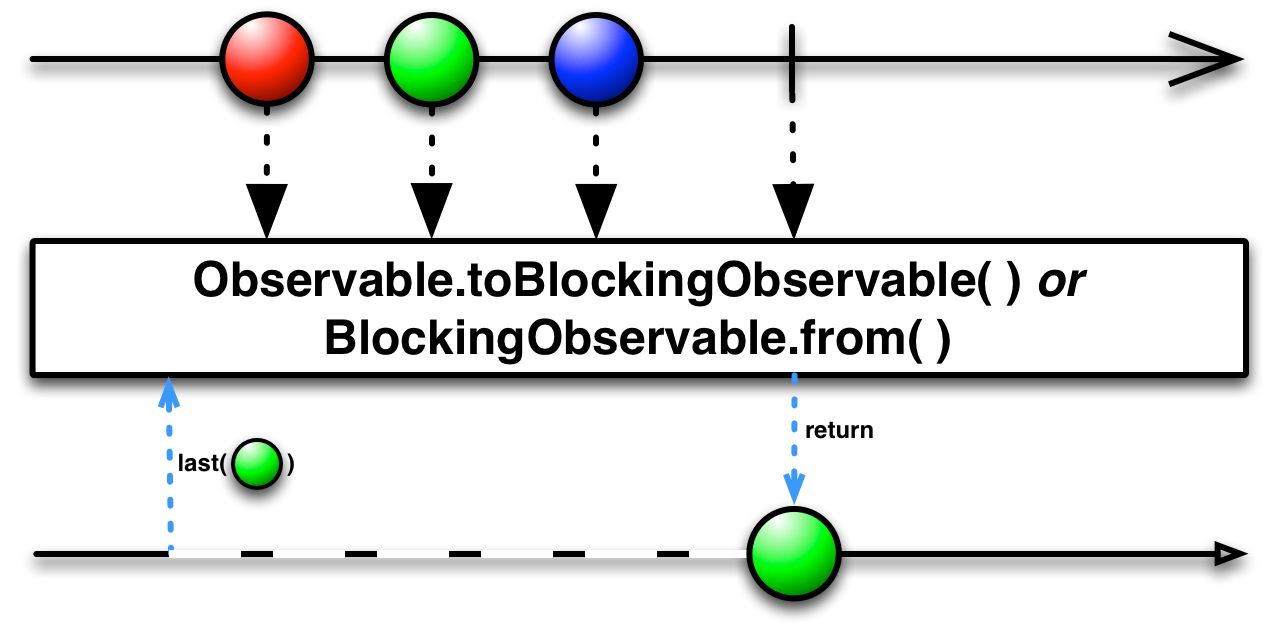 *
* @param predicate
* a predicate function to evaluate items emitted by the {@code BlockingObservable}
* @return the last item emitted by the {@code BlockingObservable} that matches the predicate
* @throws NoSuchElementException
* if this {@code BlockingObservable} emits no items
* @see ReactiveX documentation: Last
*/
public T last(final Func1 predicate) {
return blockForSingle(o.last(predicate));
}
/**
* Returns the last item emitted by this {@code BlockingObservable}, or a default value if it emits no
* items.
*
*
* @param predicate
* a predicate function to evaluate items emitted by the {@code BlockingObservable}
* @return the last item emitted by the {@code BlockingObservable} that matches the predicate
* @throws NoSuchElementException
* if this {@code BlockingObservable} emits no items
* @see ReactiveX documentation: Last
*/
public T last(final Func1 predicate) {
return blockForSingle(o.last(predicate));
}
/**
* Returns the last item emitted by this {@code BlockingObservable}, or a default value if it emits no
* items.
*
* 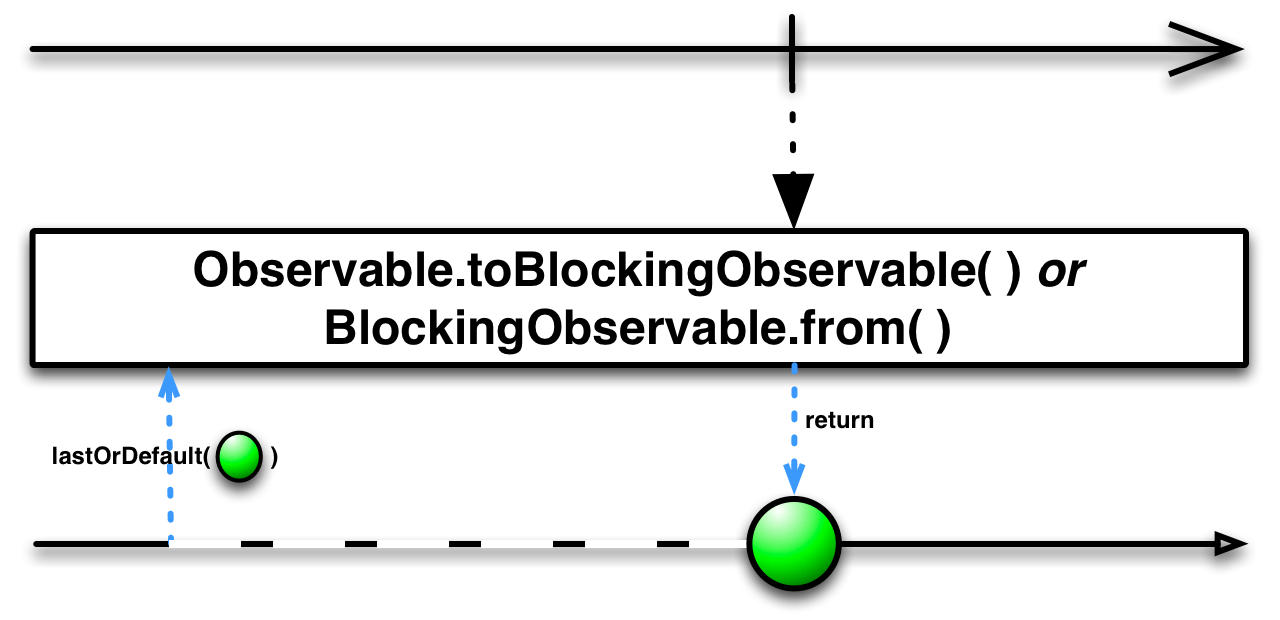 *
* @param defaultValue
* a default value to return if this {@code BlockingObservable} emits no items
* @return the last item emitted by the {@code BlockingObservable}, or the default value if it emits no
* items
* @see ReactiveX documentation: Last
*/
public T lastOrDefault(T defaultValue) {
return blockForSingle(o.map(UtilityFunctions.
*
* @param defaultValue
* a default value to return if this {@code BlockingObservable} emits no items
* @return the last item emitted by the {@code BlockingObservable}, or the default value if it emits no
* items
* @see ReactiveX documentation: Last
*/
public T lastOrDefault(T defaultValue) {
return blockForSingle(o.map(UtilityFunctions.identity()).lastOrDefault(defaultValue));
}
/**
* Returns the last item emitted by this {@code BlockingObservable} that matches a predicate, or a default
* value if it emits no such items.
*
* 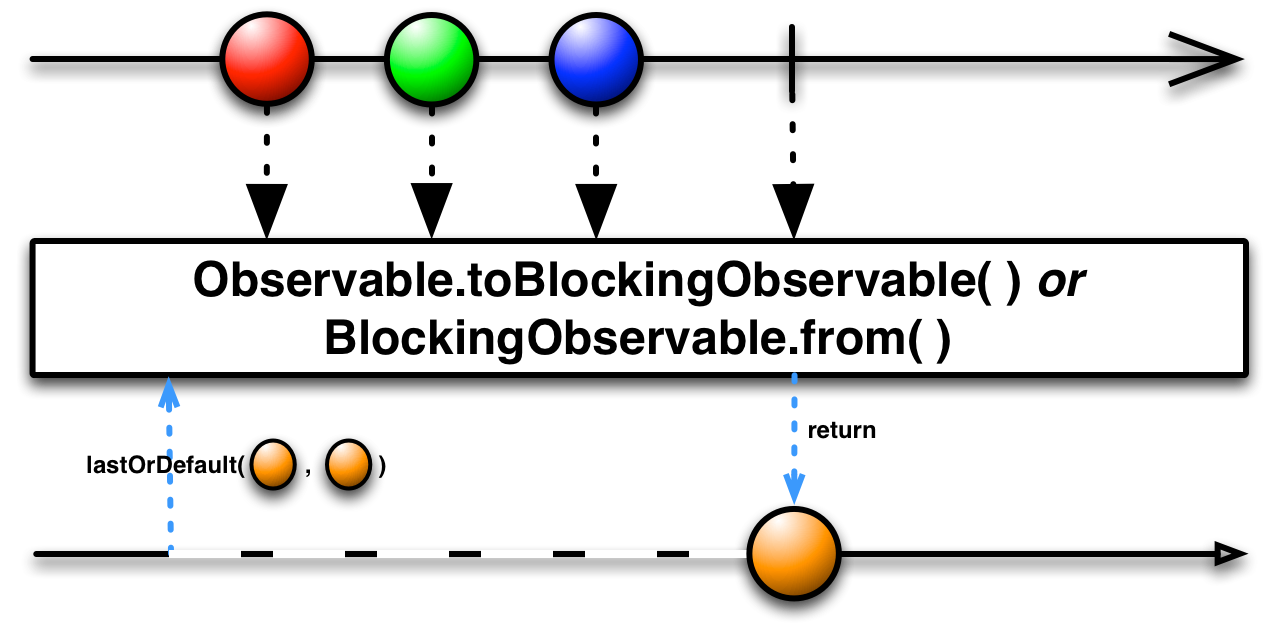 *
* @param defaultValue
* a default value to return if this {@code BlockingObservable} emits no matching items
* @param predicate
* a predicate function to evaluate items emitted by this {@code BlockingObservable}
* @return the last item emitted by this {@code BlockingObservable} that matches the predicate, or the
* default value if it emits no matching items
* @see ReactiveX documentation: Last
*/
public T lastOrDefault(T defaultValue, Func1 predicate) {
return blockForSingle(o.filter(predicate).map(UtilityFunctions.
*
* @param defaultValue
* a default value to return if this {@code BlockingObservable} emits no matching items
* @param predicate
* a predicate function to evaluate items emitted by this {@code BlockingObservable}
* @return the last item emitted by this {@code BlockingObservable} that matches the predicate, or the
* default value if it emits no matching items
* @see ReactiveX documentation: Last
*/
public T lastOrDefault(T defaultValue, Func1 predicate) {
return blockForSingle(o.filter(predicate).map(UtilityFunctions.identity()).lastOrDefault(defaultValue));
}
/**
* Returns an {@link Iterable} that always returns the item most recently emitted by this
* {@code BlockingObservable}.
*
*  *
* @param initialValue
* the initial value that the {@link Iterable} sequence will yield if this
* {@code BlockingObservable} has not yet emitted an item
* @return an {@link Iterable} that on each iteration returns the item that this {@code BlockingObservable}
* has most recently emitted
* @see ReactiveX documentation: First
*/
public Iterable
*
* @param initialValue
* the initial value that the {@link Iterable} sequence will yield if this
* {@code BlockingObservable} has not yet emitted an item
* @return an {@link Iterable} that on each iteration returns the item that this {@code BlockingObservable}
* has most recently emitted
* @see ReactiveX documentation: First
*/
public Iterable mostRecent(T initialValue) {
return BlockingOperatorMostRecent.mostRecent(o, initialValue);
}
/**
* Returns an {@link Iterable} that blocks until this {@code BlockingObservable} emits another item, then
* returns that item.
*
*  *
* @return an {@link Iterable} that blocks upon each iteration until this {@code BlockingObservable} emits
* a new item, whereupon the Iterable returns that item
* @see ReactiveX documentation: TakeLast
*/
@SuppressWarnings({ "cast", "unchecked" })
public Iterable
*
* @return an {@link Iterable} that blocks upon each iteration until this {@code BlockingObservable} emits
* a new item, whereupon the Iterable returns that item
* @see ReactiveX documentation: TakeLast
*/
@SuppressWarnings({ "cast", "unchecked" })
public Iterable next() {
return BlockingOperatorNext.next((Observable)o);
}
/**
* Returns an {@link Iterable} that returns the latest item emitted by this {@code BlockingObservable},
* waiting if necessary for one to become available.
*
* If this {@code BlockingObservable} produces items faster than {@code Iterator.next} takes them,
* {@code onNext} events might be skipped, but {@code onError} or {@code onCompleted} events are not.
*
* Note also that an {@code onNext} directly followed by {@code onCompleted} might hide the {@code onNext}
* event.
*
* @return an Iterable that always returns the latest item emitted by this {@code BlockingObservable}
* @see ReactiveX documentation: First
*/
@SuppressWarnings({ "cast", "unchecked" })
public Iterable latest() {
return BlockingOperatorLatest.latest((Observable)o);
}
/**
* If this {@code BlockingObservable} completes after emitting a single item, return that item, otherwise
* throw a {@code NoSuchElementException}.
*
* 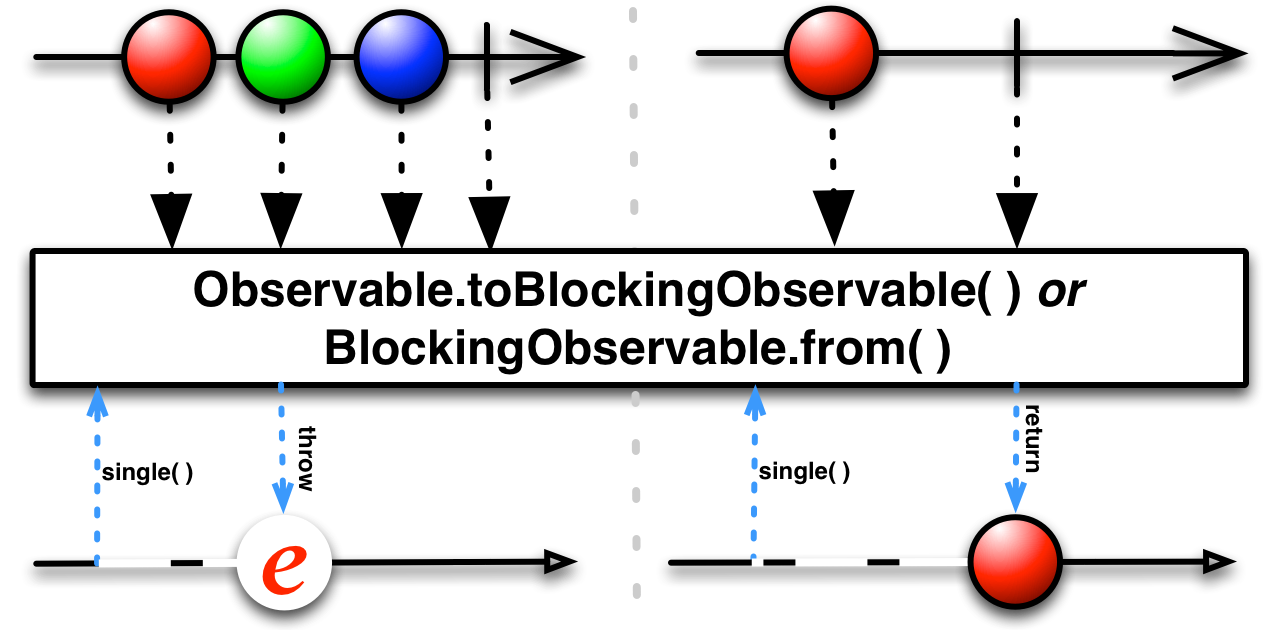 *
* @return the single item emitted by this {@code BlockingObservable}
* @see ReactiveX documentation: First
*/
public T single() {
return blockForSingle(o.single());
}
/**
* If this {@code BlockingObservable} completes after emitting a single item that matches a given predicate,
* return that item, otherwise throw a {@code NoSuchElementException}.
*
*
* @return the single item emitted by this {@code BlockingObservable}
* @see ReactiveX documentation: First
*/
public T single() {
return blockForSingle(o.single());
}
/**
* If this {@code BlockingObservable} completes after emitting a single item that matches a given predicate,
* return that item, otherwise throw a {@code NoSuchElementException}.
*
*  *
* @param predicate
* a predicate function to evaluate items emitted by this {@link BlockingObservable}
* @return the single item emitted by this {@code BlockingObservable} that matches the predicate
* @see ReactiveX documentation: First
*/
public T single(Func1 predicate) {
return blockForSingle(o.single(predicate));
}
/**
* If this {@code BlockingObservable} completes after emitting a single item, return that item; if it emits
* more than one item, throw an {@code IllegalArgumentException}; if it emits no items, return a default
* value.
*
*
* @param predicate
* a predicate function to evaluate items emitted by this {@link BlockingObservable}
* @return the single item emitted by this {@code BlockingObservable} that matches the predicate
* @see ReactiveX documentation: First
*/
public T single(Func1 predicate) {
return blockForSingle(o.single(predicate));
}
/**
* If this {@code BlockingObservable} completes after emitting a single item, return that item; if it emits
* more than one item, throw an {@code IllegalArgumentException}; if it emits no items, return a default
* value.
*
* 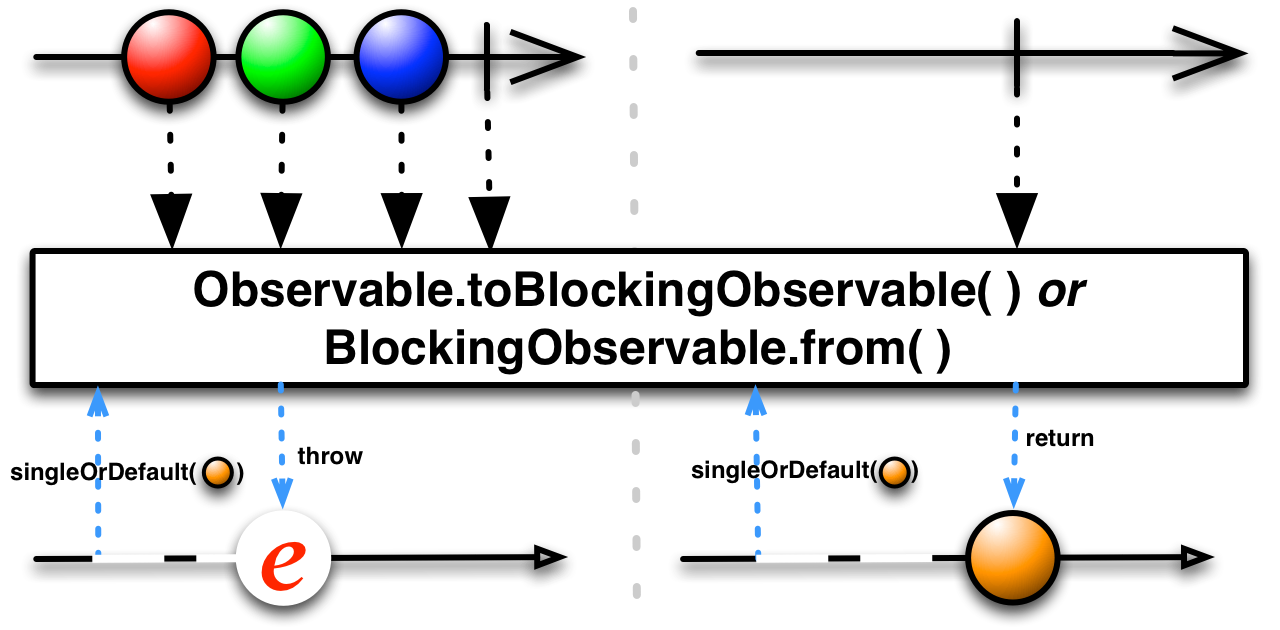 *
* @param defaultValue
* a default value to return if this {@code BlockingObservable} emits no items
* @return the single item emitted by this {@code BlockingObservable}, or the default value if it emits no
* items
* @see ReactiveX documentation: First
*/
public T singleOrDefault(T defaultValue) {
return blockForSingle(o.map(UtilityFunctions.
*
* @param defaultValue
* a default value to return if this {@code BlockingObservable} emits no items
* @return the single item emitted by this {@code BlockingObservable}, or the default value if it emits no
* items
* @see ReactiveX documentation: First
*/
public T singleOrDefault(T defaultValue) {
return blockForSingle(o.map(UtilityFunctions.identity()).singleOrDefault(defaultValue));
}
/**
* If this {@code BlockingObservable} completes after emitting a single item that matches a predicate,
* return that item; if it emits more than one such item, throw an {@code IllegalArgumentException}; if it
* emits no items, return a default value.
*
*  *
* @param defaultValue
* a default value to return if this {@code BlockingObservable} emits no matching items
* @param predicate
* a predicate function to evaluate items emitted by this {@code BlockingObservable}
* @return the single item emitted by the {@code BlockingObservable} that matches the predicate, or the
* default value if no such items are emitted
* @see ReactiveX documentation: First
*/
public T singleOrDefault(T defaultValue, Func1 predicate) {
return blockForSingle(o.filter(predicate).map(UtilityFunctions.
*
* @param defaultValue
* a default value to return if this {@code BlockingObservable} emits no matching items
* @param predicate
* a predicate function to evaluate items emitted by this {@code BlockingObservable}
* @return the single item emitted by the {@code BlockingObservable} that matches the predicate, or the
* default value if no such items are emitted
* @see ReactiveX documentation: First
*/
public T singleOrDefault(T defaultValue, Func1 predicate) {
return blockForSingle(o.filter(predicate).map(UtilityFunctions.identity()).singleOrDefault(defaultValue));
}
/**
* Returns a {@link Future} representing the single value emitted by this {@code BlockingObservable}.
*
* If {@link BlockingObservable} emits more than one item, {@link java.util.concurrent.Future} will receive an
* {@link java.lang.IllegalArgumentException}. If {@link BlockingObservable} is empty, {@link java.util.concurrent.Future}
* will receive an {@link java.util.NoSuchElementException}.
*
* If the {@code BlockingObservable} may emit more than one item, use {@code Observable.toList().toBlocking().toFuture()}.
*
*  *
* @return a {@link Future} that expects a single item to be emitted by this {@code BlockingObservable}
* @see ReactiveX documentation: To
*/
@SuppressWarnings({ "cast", "unchecked" })
public Future
*
* @return a {@link Future} that expects a single item to be emitted by this {@code BlockingObservable}
* @see ReactiveX documentation: To
*/
@SuppressWarnings({ "cast", "unchecked" })
public Future toFuture() {
return BlockingOperatorToFuture.toFuture((Observable)o);
}
/**
* Converts this {@code BlockingObservable} into an {@link Iterable}.
*
* 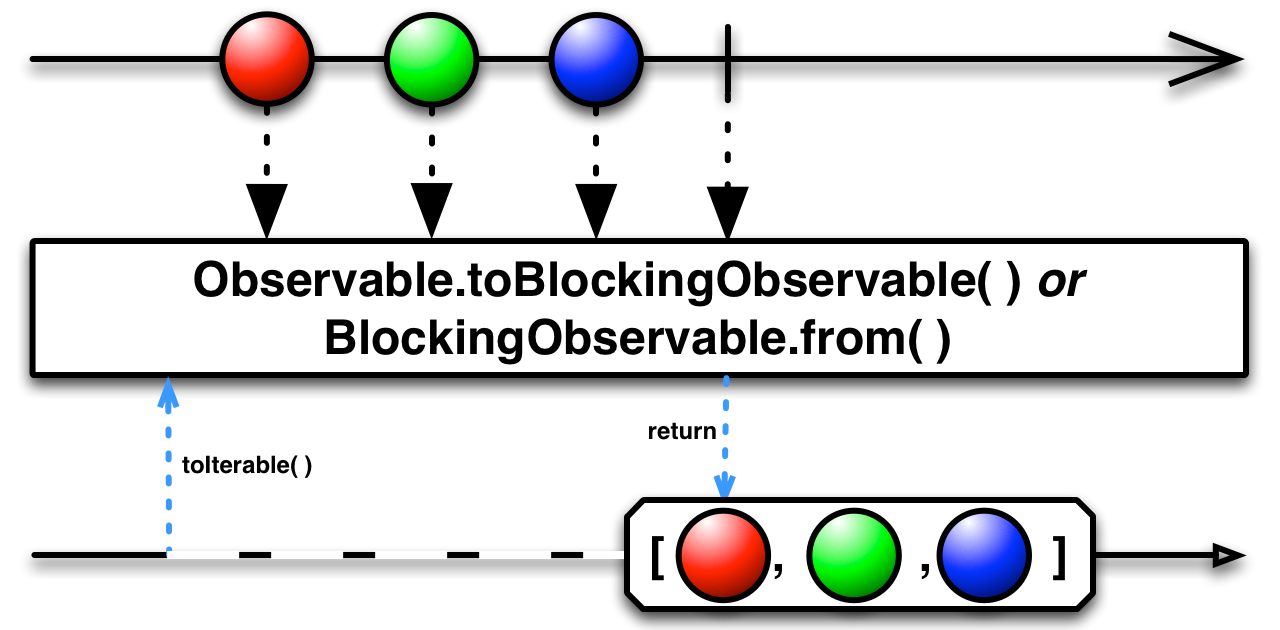 *
* @return an {@link Iterable} version of this {@code BlockingObservable}
* @see ReactiveX documentation: To
*/
public Iterable
*
* @return an {@link Iterable} version of this {@code BlockingObservable}
* @see ReactiveX documentation: To
*/
public Iterable toIterable() {
return new Iterable() {
@Override
public Iterator iterator() {
return getIterator();
}
};
}
/**
* Helper method which handles the actual blocking for a single response.
*
* If the {@link Observable} errors, it will be thrown right away.
*
* @return the actual item
*/
private T blockForSingle(final Observable observable) {
final AtomicReference returnItem = new AtomicReference();
final AtomicReference returnException = new AtomicReference();
final CountDownLatch latch = new CountDownLatch(1);
@SuppressWarnings("unchecked")
Subscription subscription = ((Observable)observable).subscribe(new Subscriber() {
@Override
public void onCompleted() {
latch.countDown();
}
@Override
public void onError(final Throwable e) {
returnException.set(e);
latch.countDown();
}
@Override
public void onNext(final T item) {
returnItem.set(item);
}
});
BlockingUtils.awaitForComplete(latch, subscription);
if (returnException.get() != null) {
Exceptions.propagate(returnException.get());
}
return returnItem.get();
}
/**
* Runs the source observable to a terminal event, ignoring any values and rethrowing any exception.
*/
@Experimental
public void subscribe() {
final CountDownLatch cdl = new CountDownLatch(1);
final Throwable[] error = { null };
@SuppressWarnings("unchecked")
Subscription s = ((Observable)o).subscribe(new Subscriber() {
@Override
public void onNext(T t) {
// deliberately ignored
}
@Override
public void onError(Throwable e) {
error[0] = e;
cdl.countDown();
}
@Override
public void onCompleted() {
cdl.countDown();
}
});
BlockingUtils.awaitForComplete(cdl, s);
Throwable e = error[0];
if (e != null) {
Exceptions.propagate(e);
}
}
/**
* Subscribes to the source and calls back the Observer methods on the current thread.
* @param observer the observer to call event methods on
*/
@Experimental
public void subscribe(Observer observer) {
final NotificationLite nl = NotificationLite.instance();
final BlockingQueue